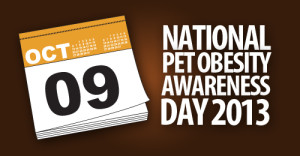Pet Obesity Awareness – What You Need To Know
 Did you know what the most common nutrition related health condition in dogs is? It is obesity and tens of millions or about 40 percent of the dog population is affected. Fat pets have become the new norm and the sad thing is that most owners are unaware. The primary causes are like humans—being fed too much and not enough exercise.
Did you know what the most common nutrition related health condition in dogs is? It is obesity and tens of millions or about 40 percent of the dog population is affected. Fat pets have become the new norm and the sad thing is that most owners are unaware. The primary causes are like humans—being fed too much and not enough exercise.
The pet owners may notice layers of fat over their pets ribs, along the spine and around the tail. Your pet may have difficulty breathing and have a reduced exercise intolerance. There is a strong relationship in dogs between obesity and diabetes. The early signs of diabetes is the same as people-excessive thirst and urination. With obesity we see several medical problems that could be preventable. These include: heart disease, increased blood pressure, heat intolerance, joint damage and cancer. There can be an increased risk of complications during surgery. The research shows that your pets life can be shortened by 2 to 2 ½ years.
If you think that your pet has an obesity problem, seek your veterinarian’s advice. Because they are the expert in the field. Please don’t do it yourself because your pet’s nutrition and exercise program needs to be monitored closely. Especially in hot weather because of the stress on the heart and lungs.
When setting up a visit with your veterinarian, they will do a physical examination with blood tests. Ideally, the veterinarian will check the heart and lungs and check for signs of hormonal diseases such as hypothyroidism. They will then set up and ideal weight and send home some feeding and exercise guidelines. Initially, I recommend that a follow up visit be made for 4 to 6 weeks. It will probably take several months for your pet to reach its goal.
Pet owners must remember that it will take a family effort in getting everyone on board. It may work best to have only one family member in charge of feeding, but have everyone help exercise. Success can only happen by change, but it will bring healthy results. Which will bring a longer life for your pet.
Your veterinarian will probably recommend a reduced calorie diet. I would recommend that your pet also take a vitamin and mineral supplement to insure that the micro-nutrient and the essential fatty acids requirements are met. It may be good to give some fish oil to maintain good health.
It seems as owners that we tend to take the easy way out and reach into the cookie jar. In the end, living a life in which you prioritize healthy eating and exercise for all members of the family is the key. This means no more treats every time your dog does a trick. If you feel that they need a reward, give them praise and affection.
Join us as we recognize National Pet Obesity Awareness on Wednesday, October 9th this year, and help us prolong the life of your beloved companion.
